Photographs: B Mathur/Reuters
The meeting between the foreign ministers of India and Pakistan in New Delhi on Wednesday ended on a positive note with visiting Pakistan Foreign Minister Hina Rabbani Khar calling for a "new era of amity".
While External Affairs Minister S M Krishna said that the talks had been "useful" and on the right track, his young Pakistani counterpart was more upbeat about the bilateral dialogue process.
Khar, who recently took over as Pakistan's foreign minister, lauded the "spirit in which we have been able to sustain the dialogue and, will hopefully take it through the next round."
Pakistan was committed to the dialogue process and she believed that it was in both countries "national interest to have good neighbourly relations" with each other.
Both sides should work to make the bilateral dialogue process "an uninterrupted and uninterruptable process," said Khar.
Reportage: Shubha Singh
'We should take ownership of our own affairs'
Image: Pakistan's Foreign Minister Hina Rabbani KharPhotographs: B Mathur/Reuters
It was important to sustain the dialogue process to make it a "truly people centric process," she said.
The Pakistani minister added, "As two responsible states, we should take ownership of our own affairs."
She expressed hope that the "new generations in our countries will see relations that are much different from the last two decades."
The new Pakistani minister's optimistic attitude is unusual for a visiting Pakistani minister and in sharp contrast to the stance adopted by her predecessor Shah Mahmood Qureshi.
Qureshi had gotten embroiled in a public disagreement with Krishna at the last meeting between the foreign ministers in Islamabad in July last year.
'Our relations are on the right track'
Image: A file photo of former Pakistan Foreign Minister Shah Mahmood Qureshi with S M KrishnaPhotographs: Jay Mandal/On Assignment
There was a "changed mindset" among the people of the two countries for a "friendly, cooperative relationship," opined Khar.
Talking to the media after the two-hour long discussion with his Pakistani counterpart, Krishna said he was "satisfied at the progress achieved in this round of the resumed dialogue."
Both sides have reaffirmed their commitment to resolve all outstanding issues through a comprehensive, serious and sustained dialogue.
"While being fully cognisant of the challenges that lie ahead, I can confidently say that our relations are on the right track," he said.
The Indian side also conveyed its displeasure over Khar's meeting with Hurriyat leaders shortly after she arrived in New Delhi on Monday evening.
Khar also held a meeting with Jammu Kashmir Liberation Front Leader Yasin Malik in Lahore just before her trip to Delhi, where she spoke about tripartite talks with "genuine Kashmiri leaders".'There are divergences'
Image: A Kashmiri youth throws a piece of brick towards the police during a clash in SrinagarPhotographs: Fayaz Kabli/Reuters
The meeting was also attended by Pakistan's Foreign Secretary Salman Bashir.
Visiting Pakistani ministers have often met Hurriyat leaders but have rarely committed the indiscretion of doing so before meeting their hosts and holding official talks.
When queried about the meeting during her joint press conference with Bashir, Foreign Secretary Nirupma Rao admitted that there was a divergence of views over the issue.
"There are divergences. It has been highlighted from Tuesday's meeting. We have expressed concerns in a frank and candid manner to Pakistan," she said.
The contentious subject of Kashmir was discussed by the two ministers and they agreed on the need for further discussions in a "positive and forward looking manner".
During the talks, the two sides agreed to revive the India-Pakistan Joint Commission after more than two decades. Technical level working groups would meet to identify avenues of cooperation.
What Krishna and Khar discussed
They also agreed on separate meetings of Expert Groups on nuclear and conventional confidence building measures to be held in Islamabad in September this year.
The two ministers approved a slew of measures that would go a long way in facilitating the trade and movement of people across the Line of Control in Jammu and Kashmir.
The measures included streamlining the issue of entry permits and increasing the duration to six months, upgrading telephone communications and increasing the number of days and hours during which trucks can cross the LoC.
They also agreed to expand cross-LoC travel to allow for tourism and religious pilgrimage.
The two ministers reviewed the status of bilateral relations and the discussions that had taken place during the meetings of officials of both sides, such as on the issue of counter-terrorism (including progress on the Mumbai attack trial) and narcotics control, economic cooperation, the Tulbul Navigation Project, Sir Creek, Siachen, and Jammu & Kashmir.
India to take 'incremental, step-by-step' measures
Image: The Taj Mahal Hotel burns during the 26/11 terror strike in MumbaiBoth sides agreed on the need to strengthen cooperation on counter-terrorism among relevant departments as well as agencies to bring those responsible for terror strikes to justice, according to the joint statement issued after the ministers' meeting.
The foreign ministers' meeting completes one round of bilateral talks after they were frozen following the 26/11 terror attacks in Mumbai. This round of subject-specific bilateral talks had begun in February.
The meeting between Krishna and Khar has lived up to its expectations, for senior officials had said in the days before that "Project Pakistan was no longer on life support, it has begun to breathe on its own."
The confidence building measures that were agreed upon are in line with the Indian government's approach to take up "incremental, step-by-step" measures rather than build up euphoria and high expectations.

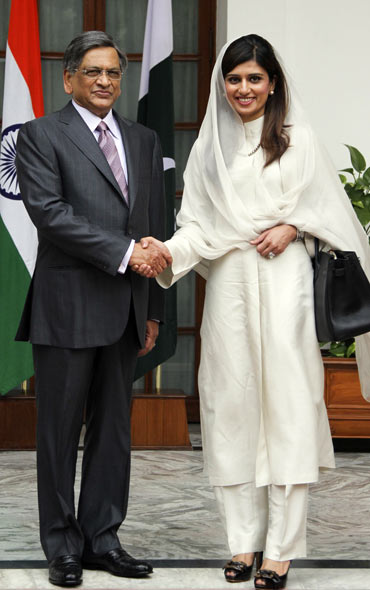

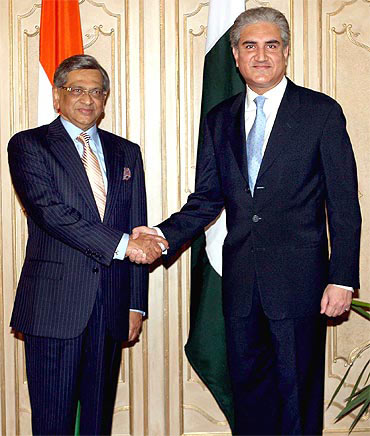
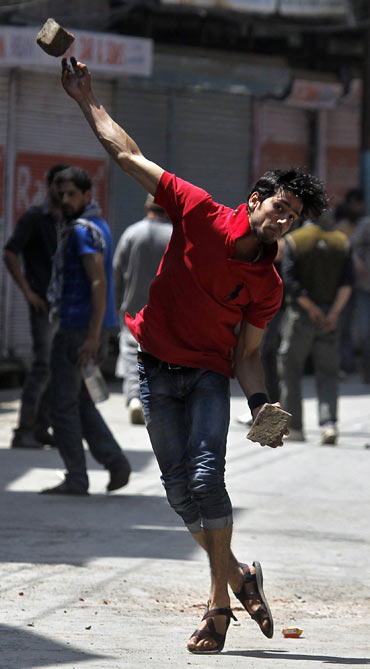
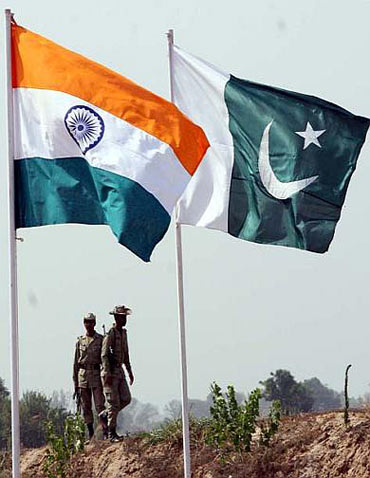
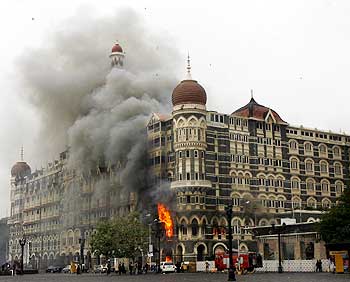
article